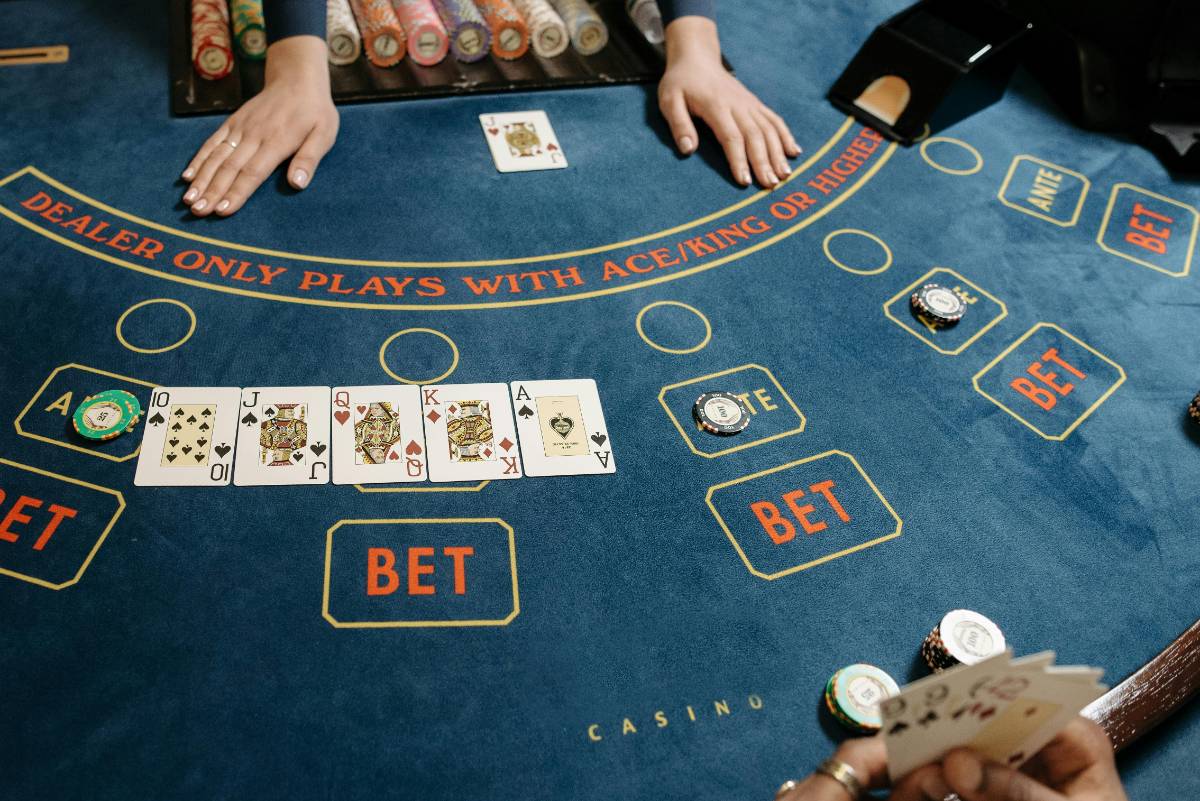
Live dealer roulette also offers a human connection that’s missing in standard online formats. Players can chat with the dealer, celebrate wins alongside others at the table, and feel the excitement of a communal atmosphere, all while sitting in their living rooms. This interaction blends the excitement of Las Vegas with the comfort of home—a combination that makes it highly appealing in a country where convenience and entertainment often go hand in hand.
By Rahul Sharma · 07 Oct 2025
In recent years, live dealer roulette has transformed from a niche online feature into one of the fastest-growing segments of the U.S. gambling market. Combining the authenticity of a traditional casino with the convenience of digital access, this hybrid experience has struck a chord with American players. As online gambling continues to expand across the country, live dealer roulette is poised to play a central role in shaping the future of gaming in the United States. With the growth of technology, state regulations, and changing player habits, the rise of live dealer roulette is no longer just an industry prediction—it’s a reality taking shape before our eyes.
What Makes Live Dealer Roulette SpecialUnlike standard online roulette powered by random number generators (RNG), live dealer roulette uses real tables, real wheels, and human dealers broadcast through high-definition video streams. Players can place bets on their devices while watching the dealer spin the wheel in real time. This blend of trust, transparency, and interactivity creates a far more engaging experience than purely digital versions, helping it attract both newcomers and seasoned gamblers. For many, the feeling of watching the ball land on a number live removes the skepticism that sometimes surrounds digital-only casino games. In the U.S., where players value transparency and fairness, this trust factor has been a major reason for its rapid adoption.
Live dealer roulette also offers a human connection that’s missing in standard online formats. Players can chat with the dealer, celebrate wins alongside others at the table, and feel the excitement of a communal atmosphere, all while sitting in their living rooms. This interaction blends the excitement of Las Vegas with the comfort of home—a combination that makes it highly appealing in a country where convenience and entertainment often go hand in hand.
Expansion Through LegalizationOne of the biggest factors driving the future of live dealer roulette in the USA is the ongoing legalization of online gambling. States like New Jersey, Michigan, and Pennsylvania already offer live dealer games through licensed platforms, while others such as New York, Illinois, and California are actively debating the expansion of online casino regulation. The Supreme Court’s landmark 2018 ruling that allowed states to regulate sports betting also opened the door to broader gambling legislation. With tax revenues and job creation on the line, more states are expected to embrace online gambling, and live dealer roulette will be among the top offerings.
The American gambling landscape is unique because it’s regulated state by state rather than federally. This means the pace of adoption varies, but it also creates opportunities for competition among states. As each state works to attract gamblers, live dealer roulette—being both popular and profitable—is quickly becoming a standard feature. The legalization trend indicates that in the next decade, live dealer roulette will be available to the majority of Americans, not just those living in gambling-friendly states.
Technology is at the heart of why live dealer roulette is so compelling and why it will dominate the future. 5G connectivity ensures smooth streaming with no lag, even on mobile devices. Ultra-HD cameras placed at different angles provide immersive views of the wheel, dealer, and betting area. Players can switch between camera perspectives to customize their experience, making it feel closer to an in-person casino game. In addition, multi-table functionality allows players to watch and participate in more than one game simultaneously, maximizing engagement.
Looking further ahead, the integration of virtual reality (VR) and augmented reality (AR) will take live dealer roulette to unprecedented levels. Imagine putting on a VR headset and entering a digital replica of a Las Vegas casino, walking up to a roulette table, and interacting with a live dealer as though you’re physically present. AR could overlay roulette tables onto real-world environments, turning a coffee table in your home into a gaming table. These immersive technologies are no longer science fiction—they are already being tested in pilot programs by leading U.S. casino operators.
Trust remains one of the strongest selling points for live dealer roulette in the U.S. market. Unlike RNG-based games, which some skeptics suspect of being manipulated, live dealer roulette shows every spin, every ball drop, and every outcome in real time. This transparency builds confidence among players who may otherwise hesitate to gamble online. Licensed U.S. platforms also add another layer of security by being regulated, audited, and required to maintain fairness. In an era where online scams are prevalent, trust is perhaps the most valuable currency for digital casinos, and live dealer roulette capitalizes on it effectively.
Transparency also benefits casinos. By providing visible, fair gameplay, operators can attract and retain customers who may have previously stuck to land-based casinos. This assurance of fairness strengthens brand loyalty and helps U.S. operators compete against unregulated offshore platforms.
Appeal to a New Generation of PlayersYounger American gamblers, particularly Millennials and Gen Z, are driving the shift in gambling trends. They tend to prefer games that are interactive, social, and tech-driven rather than traditional slot machines. Live dealer roulette caters perfectly to these preferences. Features such as real-time chat with dealers, interactive betting interfaces, and multiplayer tables allow for a shared experience, much like gaming or streaming platforms that younger players already use.
This demographic also values flexibility. Being able to play on mobile devices during commutes, on tablets at home, or even while traveling makes live dealer roulette ideal. In fact, studies show that more than 70% of online gambling in the U.S. is now done via mobile devices, making live dealer formats even more crucial to the future. By combining social interaction, convenience, and high-quality visuals, live dealer roulette aligns perfectly with the expectations of America’s younger gamblers.
The Impact of COVID-19 on Live Dealer GamesThe COVID-19 pandemic played an unexpected role in accelerating the adoption of live dealer roulette in the USA. With casinos closed and people confined to their homes, online gambling became the only option for many players. During this period, live dealer roulette surged in popularity because it provided the closest experience to being in a real casino. Even after restrictions lifted, many players continued to prefer live dealer games, having discovered the convenience and thrill they offered. This cultural shift solidified live dealer roulette as a permanent fixture in the American gambling scene.
Economic Impact and Casino Industry ShiftsThe rise of live dealer roulette also has economic implications. Online casinos offering live dealer games generate significant revenue, contributing to state taxes and creating new jobs in technology, customer service, and broadcasting. Studios hosting live dealer games in states like New Jersey and Michigan employ hundreds of dealers, camera operators, and support staff. As more states legalize online gambling, the industry will expand further, boosting local economies while reshaping the casino workforce.
Interestingly, live dealer roulette is also changing the way physical casinos operate. Many land-based casinos are now investing in hybrid experiences, where players can participate in live dealer games from lounges or hotel rooms within the casino property itself. This integration ensures that live dealer formats complement rather than replace physical casinos, creating a win-win situation for the industry.
Future OutlookThe future of live dealer roulette in the USA is incredibly promising. The combination of legal expansion, technological innovation, and shifting player preferences makes it one of the most dynamic areas of the gambling industry. In the next five to ten years, we can expect to see nationwide legalization, VR and AR-powered experiences, and even greater personalization options for players. AI may soon be used to tailor roulette sessions to individual preferences, offering customized table limits, dealer styles, and promotional offers.
In addition, live dealer roulette will likely evolve into a more entertainment-driven format. Just as Twitch and YouTube transformed video gaming into a spectator sport, live dealer roulette may attract audiences who enjoy watching streams without necessarily betting themselves. This could lead to crossover with social media platforms, influencers hosting live roulette nights, and a blending of gambling with mainstream entertainment.
ConclusionLive dealer roulette has already proven itself as more than just a trend—it’s a revolution in how Americans gamble online. With its unique mix of authenticity, technology, and social interaction, it bridges the gap between the traditional casino floor and the digital world. Legalization across states, combined with innovation in streaming, VR, and mobile gaming, ensures that it will only grow stronger. As the industry evolves, live dealer roulette will remain at the heart of U.S. gaming, offering not just a game of chance but an experience that embodies the future of entertainment. For American players, the little wheel continues to spin—but now, it spins in living rooms, on mobile devices, and in virtual spaces across the nation.
At over two centuries old, roulette has never lost its charm. Yet, in the form of live dealer roulette, it has found new life in the American digital age. It is not just surviving the shift to online platforms—it is thriving. The fusion of tradition and innovation makes live dealer roulette a symbol of the gambling industry’s future in the USA. Its story is still unfolding, but one thing is certain: the wheel will keep spinning, and American players will keep watching with anticipation.
Subscribe to our newsletter to get our newest articles instantly!

Senior Contributor
Rahul Sharma is passionate about impactful storytelling. With a unique voice and deep insights, they turn everyday stories into compelling reads that resonate and inform.
Read Full Bio
Betting is an integral part of the gambling experience, but not all bets are created equal. The distinction between smart betting and risky betting can determine whether a player enjoys long-term success or faces repeated losses. Understanding where you stand on this spectrum is essential for anyone looking to improve their gambling strategy and maximize their enjoyment.***What Is Smart Betting?Smart betting involves making informed decisions based on probability, strategy, and careful bankroll management. Players using smart betting techniques focus on understanding odds, choosing bets with favorable risk-reward ratios, and staying disciplined. Examples include placing smaller, calculated bets on even-money options in roulette or using structured strategies like the Martingale or Fibonacci systems responsibly. Smart betting prioritizes consistency and long-term play over chasing big wins.***Characteristics of Risky BettingRisky betting is characterized by impulsive decisions, large wagers, and a reliance on luck rather than strategy. Players may chase losses, place high-stakes bets without proper consideration, or ignore bankroll limits in pursuit of quick gains. While risky betting can occasionally lead to huge wins, it often results in rapid losses and heightened stress. Emotional decision-making and overconfidence are common indicators of risky betting behavior.***Balancing Risk and RewardEvery gambler must decide their comfort level with risk. Smart betting doesn’t eliminate risk, but it manages it effectively. Risky betting, on the other hand, amplifies uncertainty and can quickly deplete funds. Finding a balance involves setting clear limits, understanding probabilities, and maintaining discipline. Diversifying bets and mixing cautious strategies with occasional higher-risk plays can provide excitement while minimizing potential losses.***Bankroll Management: A Key ComponentA crucial difference between smart and risky betting is bankroll management. Smart bettors allocate their funds across sessions, set clear budgets, and avoid chasing losses. Risky bettors often gamble impulsively, betting amounts they cannot afford to lose. Proper bankroll management ensures sustainability, reduces stress, and enhances overall enjoyment of the game.***Psychological FactorsMental discipline is essential for smart betting. Staying focused, avoiding emotional decisions, and knowing when to walk away can prevent risky behavior. Conversely, overconfidence, frustration, or the desire for instant gratification often drive risky betting. Recognizing these psychological triggers helps players make better decisions and enjoy gambling responsibly.***Practical Tips for Smart BettingSet Limits: Decide on a budget and stick to it.Understand Odds: Know the probabilities associated with each bet.Mix Strategies: Combine conservative and occasional higher-risk bets.Take Breaks: Avoid fatigue and emotional decision-making.Reflect: Regularly review your betting history to identify patterns and improve strategies.***ConclusionWhether you lean towards smart betting or risky betting significantly affects your gambling outcomes. Smart betting prioritizes strategy, discipline, and sustainable play, while risky betting focuses on chance and high-stakes thrills. By understanding your tendencies, managing your bankroll, and maintaining a disciplined approach, you can enjoy gambling responsibly while maximizing both fun and potential rewards. Ultimately, knowing where you stand helps you make informed choices and enjoy the game to its fullest.
By John Michael Smith · 10 Oct 2025

Modern casinos rely heavily on technology to ensure the safety and security of both their guests and assets. With millions of dollars changing hands daily and high-profile clientele frequenting these venues, security is paramount. Advanced systems and innovative solutions help casinos prevent fraud, monitor gaming areas, and maintain a safe environment for all patrons. The integration of technology has transformed casino security from a reactive approach to a proactive and intelligent system.***Surveillance Systems and AI MonitoringCasinos use state-of-the-art surveillance systems, often referred to as the "eye in the sky," to monitor every corner of the property. High-definition cameras, coupled with AI-powered monitoring, can detect suspicious behavior, track patterns, and alert security personnel in real time. AI algorithms can identify anomalies, such as unusual betting patterns or repeated attempts at cheating, allowing security teams to intervene before incidents escalate. This technology significantly reduces human error and increases the efficiency of surveillance operations.***Access Control and Biometric AuthenticationModern casinos employ advanced access control systems to restrict entry to sensitive areas such as cash rooms, high-limit gaming tables, and employee-only zones. Biometric authentication, including fingerprint and facial recognition, ensures that only authorized personnel can access these areas. This not only prevents internal theft but also streamlines employee verification processes. By combining physical security with biometric technology, casinos maintain a secure environment without disrupting guest experiences.***Cybersecurity MeasuresWith the rise of online gambling and digital payment methods, cybersecurity has become a critical component of modern casino security. Casinos protect sensitive data, such as customer financial information and gaming records, through encrypted networks and multi-layered firewalls. Regular security audits, intrusion detection systems, and continuous monitoring help prevent cyberattacks. Protecting both digital and physical assets ensures that casinos maintain trust and integrity among their patrons.***Fraud Detection and Gaming AnalyticsTechnology enables casinos to track and analyze gaming patterns to detect potential fraud. Advanced software can monitor card games, roulette, and slot machines to identify irregularities or cheating attempts. By analyzing large volumes of data, casinos can predict suspicious behavior and act proactively. This reduces losses and maintains a fair playing environment for all guests, reinforcing the credibility of the casino.***Emergency Response SystemsModern casinos also incorporate technology to enhance emergency preparedness. Advanced communication networks, alarm systems, and real-time monitoring ensure quick responses to fires, medical emergencies, or security breaches. Some casinos integrate AI-driven crowd management systems to guide guests safely during evacuations. By combining technology with trained personnel, casinos can respond efficiently to emergencies, minimizing risk and ensuring guest safety.***ConclusionTechnology plays a vital role in the modern casino industry by providing comprehensive security solutions that protect assets, prevent fraud, and ensure guest safety. From AI-powered surveillance and biometric access controls to cybersecurity measures and gaming analytics, these innovations allow casinos to maintain secure and fair environments. As technology continues to advance, casinos will increasingly rely on intelligent systems to enhance both safety and the overall guest experience.
By Stefen · 12 Oct 2025

Every casino game has a built-in mathematical advantage for the house, and roulette is no exception. In American Roulette, the house edge is one of the defining features of the game. It directly influences both the casino’s profitability and a player’s chances of winning. But what exactly is the house edge, and how is it calculated in American Roulette? Understanding this can help players make smarter decisions at the table.***Understanding the Concept of House EdgeThe house edge represents the long-term percentage of every wager that the casino expects to keep as profit. It’s essentially the price players pay to enjoy the game. In American Roulette, this house edge comes from the extra green slot—the double zero (00)—which increases the casino’s advantage compared to European Roulette.***How American Roulette Is StructuredAn American Roulette wheel has 38 slots: numbers 1 through 36, plus a single zero (0) and a double zero (00). Players place bets on where they think the ball will land. Payouts are structured as if the wheel had only 36 numbers, but the two extra slots give the casino its edge.***Calculating the House EdgeLet’s consider a straight-up bet, where a player wagers on a single number. The payout is 35 to 1, but the true odds of hitting a single number on an American Roulette wheel are 1 in 38. This creates a gap between the payout odds and the actual odds, and that difference is where the house edge comes from.For American Roulette, the house edge is approximately 5.26%. This means that, over time, the casino expects to keep about $5.26 for every $100 wagered on the game. It doesn’t guarantee that an individual player will lose this percentage in a single session, but across thousands of spins, this is the expected outcome.***Special Bets and Variations in EdgeWhile most bets in American Roulette carry the same 5.26% edge, there’s one exception—the “Five Number Bet,” which covers 0, 00, 1, 2, and 3. This particular wager has a house edge of 7.89%, making it the least favorable bet on the table. Experienced players often avoid it in favor of bets that keep the edge closer to the standard rate.***Why Casinos Favor American RouletteThe higher house edge is one of the main reasons casinos in Las Vegas and across the U.S. prefer American Roulette over the European version. With a 2.7% edge, European Roulette is better for players, but American Roulette offers casinos nearly double the advantage. This balance of excitement and profitability explains why the double-zero wheel is a permanent fixture in U.S. casinos.***What It Means for PlayersFor players, the house edge is a reminder that roulette is primarily a game of chance. No betting system can overcome the mathematical advantage that the casino holds. However, knowing the edge allows players to manage their expectations, choose bets more wisely, and enjoy the game for its entertainment value rather than as a guaranteed way to win money.***ConclusionThe actual house edge in American Roulette is 5.26% for most bets, with the exception of the five-number bet, which climbs to 7.89%. This advantage, built into the wheel through the addition of the double zero, is what ensures the game remains profitable for casinos while still delivering thrills to players. By understanding how the edge works, gamblers can approach American Roulette with greater awareness, making the experience more enjoyable and informed.
By Stefen · 28 Sep 2025

The online casino industry has always embraced technology to enhance player experiences, and the future of online roulette looks particularly exciting with the integration of Virtual Reality (VR) and Artificial Intelligence (AI). These cutting-edge innovations are set to transform the way players interact with the game, creating immersive, personalized, and highly engaging environments that were once unimaginable.***Virtual Reality: Immersive Roulette ExperiencesVR technology allows players to step into a virtual casino from anywhere in the world. Using VR headsets, players can walk around realistic casino environments, approach roulette tables, and interact with live dealers and other players in real time. This level of immersion makes the online experience feel as authentic as visiting a physical casino, bringing the sights and sounds of the wheel to life. VR also opens possibilities for themed roulette tables, adding creativity and excitement to traditional gameplay.***Artificial Intelligence: Personalized and Smarter GamingAI is transforming online roulette by analyzing player behavior and preferences to offer personalized experiences. For example, AI can suggest betting strategies, identify patterns in gameplay, and provide tailored recommendations to enhance engagement. Moreover, AI-driven chatbots and virtual dealers can interact naturally with players, creating a more dynamic and responsive gaming environment. This integration ensures that the game adapts to individual players, making each session unique and engaging.***Benefits for Players and CasinosFor players, VR and AI offer heightened realism, interactive gameplay, and personalized guidance that can improve enjoyment and learning. For casinos, these technologies attract new audiences, increase engagement, and provide valuable insights into player behavior. Together, they create a more captivating and intelligent ecosystem that benefits both sides.***Challenges and ConsiderationsDespite the excitement, integrating VR and AI comes with challenges. VR requires powerful hardware and stable internet connections, which can limit accessibility for some players. AI systems must balance personalization with fairness, ensuring that player experience enhancements do not compromise game integrity. Developers also need to address privacy concerns when analyzing player data to maintain trust.***The Road AheadAs technology continues to evolve, the future of online roulette will likely blend VR and AI to create experiences that are more immersive, interactive, and player-centric than ever before. We may see multi-player VR roulette rooms, AI-guided tutorials, and highly adaptive game interfaces that respond to a player’s mood and style. This technological evolution promises to redefine online gambling, making it smarter, more engaging, and increasingly realistic.***ConclusionThe fusion of VR and AI is poised to revolutionize online roulette, offering players experiences that combine the thrill of a real casino with the advantages of digital innovation. As these technologies mature, online roulette will become more immersive, interactive, and personalized, transforming not just how we play, but how we perceive the game itself. Players and casinos alike stand to benefit from this exciting evolution, marking a bold new era in the world of online gambling.
By Abraham Benjamin · 13 Oct 2025